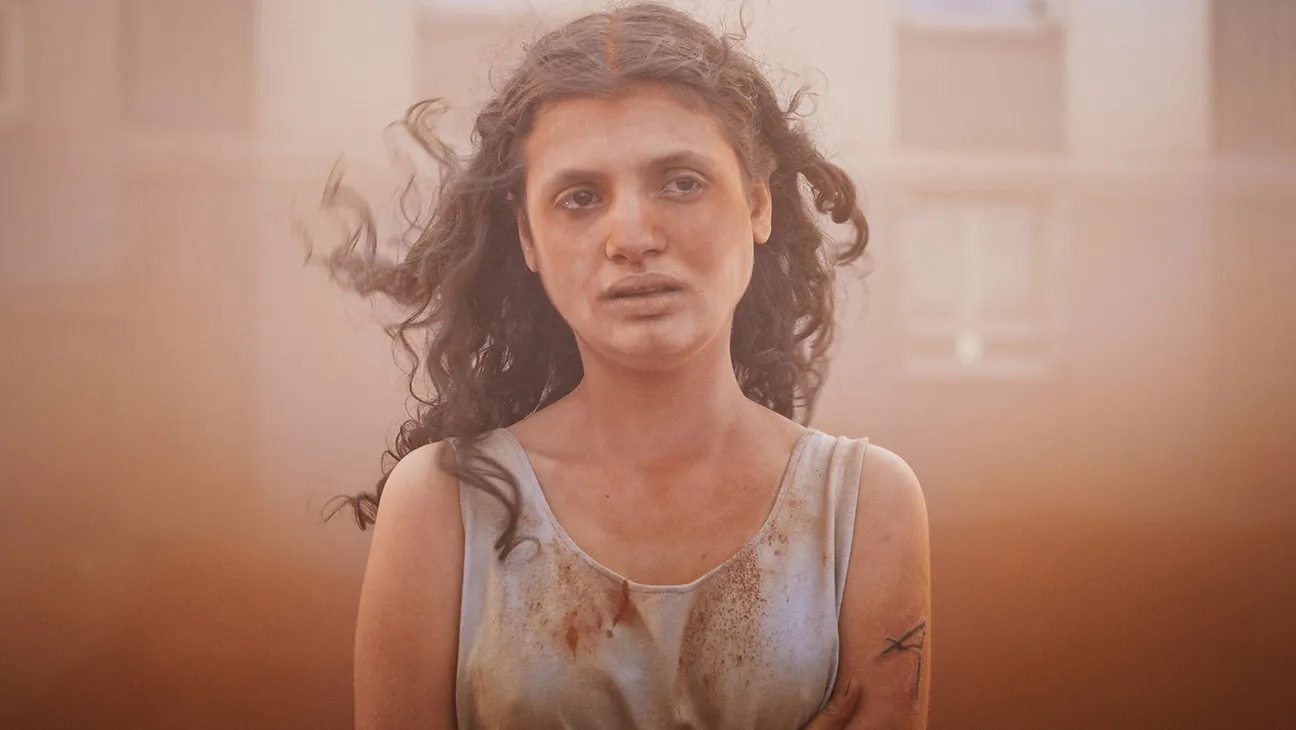Director: Julia Ducournau
Writer: Julia Ducournau
Stars: Mélissa Boros, Tahar Rahim, Golshifteh Farahani
Synopsis: Alpha, 13, is a troubled teenager who lives alone with her mother. Their world comes crashing down the day she comes home from school with a tattoo on her arm.
It is fair to say, and has been said many times at this point, that the pandemic was a cursed time for all of us, brooding in enclosed rooms, dealing with our unshielded minds, and fear lingering in the possibility of being infected with this disease that took the lives of many around the world. All of us were scared; it was a time nobody wants to repeat. At Cannes this year, there is a blatantly obvious (and outright trepid) film about said time, in all of its political madness and societal hysteria, in Ari Aster’s Eddington. But there is another picture about a disease that consumes people inside and out in Julia Ducournau’s Alpha (screening in competition at the 2025 Cannes Film Festival), the follow-up to her Palme d’Or-winning Titane.
From the director who brought us touching pictures from bloody, brutal, and strange canvases–a father-daughter story intertwined with John Carpenter’s Christine in the aforementioned 2021 picture and a story about sisters and their sins of the flesh in Raw–you never know what to expect, which is a testament to her visionary artistry and brilliance. And so her next move is completely unexpected: a very personal and mournful rumination on the AIDS crisis, the loss of loved ones, our fear of death, and the succumbing nature of grief and loneliness. This is not feral or as violent as her previous features, but Alpha is equally tantalizing in its observations of the flesh and how it taints the soul, and vice versa. Ducournau switches from the Cronenbergian style of body horror. However, this is in a more poetic manner rather than visceral, to the existentialism of the works of Clive Barker and the dark poems of Edgar Allen Poe.
“This shift redefines Ducournau’s voice in horror—now steeped in vulnerability and emotional risk, rather than just visceral shock. It proposes the question: “How are you born into the world when everything around you is dying,” as she stated in an interview before the film’s world premiere. The answer to that question is not easily decipherable, even after seeing Alpha, since it is a very tricky picture to pick apart. However, Ducournau ensures that her response comes from within–her deepest fears and worries rooted in her past experiences. The film has a bruised heart, beating slowly, yet at a pace where one can still sense each ounce of pain and sincerity Ducournau felt then and still does. But it is a heart, and whether bruised or not, the cast and crew care for it, to the point you feel moved, vastly so.
Alpha follows the titular character, played by newcomer Mélissa Boros (another excellent addition to Ducournau’s talented selection of young lead actresses), a thirteen-year-old girl going through the growing pains of adolescence. Alpha shows signs of the atypical behavior a teenager goes through, rage, defiance, and everything in between. Ducournau’s protagonists have had this angst and terror inside them, whether from the beginning (Agathe Rouselle’s Alexia) or gradually (Garance Marillier’s Justine). But no matter which one of these it is, they have an innocence to them–a search for nurture and care in the moments of darkness. And the young Alpha is no different, with discontent on the outside while vulnerable on the inside. She sees her life in disarray and disrepair, just like the classrooms and bathrooms in her school, all deteriorated and torn apart.
The film’s color palette matches the brooding deterioration with desaturated colors, emphasizing greys and blacks, that diverges from cinematographer Ruben Impens’ more lively lens in his previous Ducournau collaborations. Still, the feeling in the atmosphere remains palpable, even if it is a feeling one wouldn’t want to be in the presence of for far too long. As this disrepair in the school is not noticed by her classmates, you get the feeling that this sensation the film basks on–the grey color-tainted lens covering, and eating, the scenery whole–is seen through the eyes of Alpha. The young girl envisions this dystopian world through freezing-cold glasses of decay. Later, this perception becomes more collective, where Ducournau exhibits her most mature and moving storytelling in her directorial career.
At this point in the narrative, it is all on Alpha, who wanders through this world in this saturated state of mind. In one of her acts of teenage defiance, Alpha gets a tattoo–a giant capitalized letter A on her arm–alongside some other classmates, all sharing the same dirty needle. The tattoo does not look good and isn’t healing properly. Once she gets home, and her mother (Golshifteh Farahani) finds out about it, panic amongst the household occurs not because of her rebellious ways specifically, but of what the needle might have transmitted to her. There is a possibility that Alpha has contracted a deadly blood-related disease that turns people into marble statues, stone cadavers with a sand-ish color that causes chills down your spine once you see them.
It reminded me of the burial shrouds in David Cronenberg’s latest work, The Shrouds. Instead of seeing a body in a bag, with a screen as an attachment to see your loved one decompose, it is people turning into raw material–both being monuments for the dead, their headstone. These are two creative ways of having filmmakers explore their fears of death and the grieving process. In the Cannes press conference for Alpha, Ducournau elaborated plenty on her references, particularly the small easter eggs she placed about Edgar Allen Poe in the film, saying plenty about that specific image of the statues and how it reflects her existential dread. And it is curious, and utmost fascinating, how Cronenberg and Ducournau–the labeled king and queen of body horror by many (including me)–made poetic films that, on one side of their multilayered story, reflect their mortality and fears of one day venturing into the void.
When those scenes appear, whether the shrouds or marble statues, there’s a coldness that strips the films of any amount of life for a few seconds and feels the worries of the auteurs, the darkness overcoming the light–drowning in the pool of existence. It is just not a coincidence, as also at last year’s Cannes there were many other features, from veteran directors specifically, that talked about memory and existence in different ways, shapes, and forms: Paul Schrader’s Oh, Canada, Francis Ford Coppola’s Megalopolis, Leos Carax’s It’s Not Me, Jean-Luc Godard’s Scenarios, etc. The pandemic caused them to reflect. Time was running out, or at least it seemed like that to many; as Schrader said during the Q&As for his film: “If I’m going to make a film about death, I’d better hurry up.”
These filmmakers were in a “rush” to make a picture that channeled their own lives; we watched and traversed through their memories, experiences, woes, and joys via a uniform canvas, being distinct compared to the rest of their work, and very personal. While Ducournau does not explore legacy like the rest of the aforementioned projects, as she is still young in the medium, she does present herself in a new light with an unexpected swing towards the mature, without the shock. She utilizes her dark memories from her time as a kid during the ‘80s and ‘90s, the time of the AIDS crisis, and adds in the trepidation of the COVID pandemic to paint a portrait of the melancholy waves both periods were riding on. She saw many people pass away during these times, which left a mark on her, leading to the creation of Alpha, a film that wants to remember those we lost.
This is only one angle of the film’s narrative. As it develops, Ducournau constructs a touching brother-sister story amidst the terror boiling from the effects of a rebellious tattoo. That part of the story is also rooted in a needle, used by a past addict. Alpha’s estranged uncle, Amin (Tahar Rahim, in a Machinist-like role), re-enters her life after many years, with flashbacks to when she was five years old, where she draws with a marker the scars on his arm, a symbolic, quick image of the beauty in destruction, and vice versa. He comes back, a ghost from the past. And Alpha fears death is knocking at her door, waiting to collect. The last image of Ingmar Bergman’s The Seventh Seal started to appear in my mind. Her bones go cold; her body gets numb. The greys become greyer, and the shadows loom heavily.
Everybody in her class set her to the side, with the belief that they’ll get infected. The community ostracizes her entire family. And Amin helps her navigate this life of distress and adversity. The two of them, affected by a needle, find mutual understanding in pain and melancholy. Alpha begins to care for Amin, even as his emotions fluctuate from this withdrawal. Her mother cares for the two connected, misguided souls, as the worries grow stronger, a resistance to fixing what has been broken for years. This is where Ducournau, alongside editor Jean-Christophe Bouzy, breaks the canvas and plays with time, memory, and dreams to create a new abstract mural that unites the wounds, literally and metaphorically, of the past, present, and possible futures. It is an uncanny presentation, often rich in poetic prose and vivid imagery, focusing on the nature of reality.
The messy fractures of lineage and genre work for and against the film, with Ducournau often placing the viewer in between the thin line of distance and closeness, yet always with a sense of compassion shining through the darkness, even at its most mournful scenes, which there are plenty of. Ultimately, Ducournau basks in the dread that consumes the people who lose someone they love, finding beauty in passing from one plain to another. Alpha is contrived with abstractions and despair, never letting go until you do; like grief, you must let go to stop the emotional bleeding. But it is a maneuver so personal and pensive that you can’t help but accept this dance with death for two hours.







